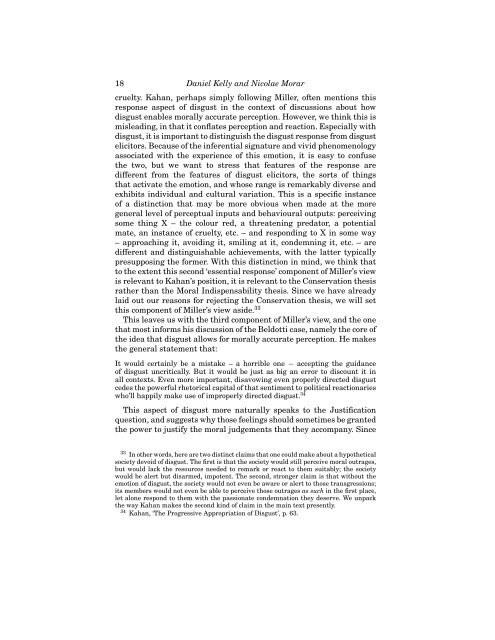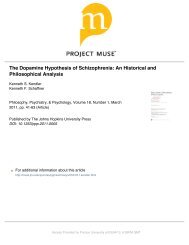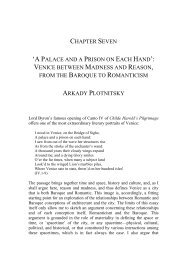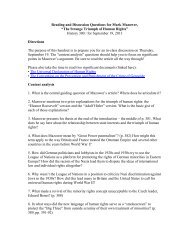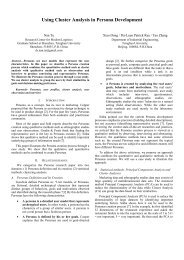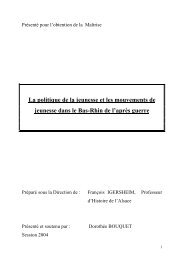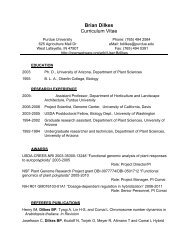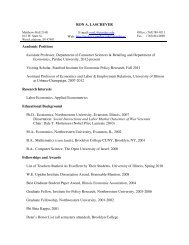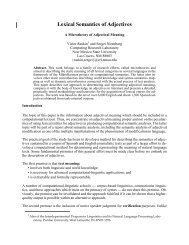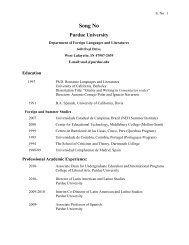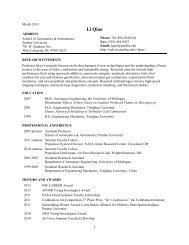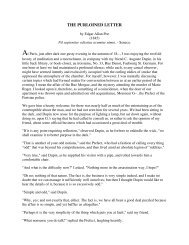Against the Yuck Factor - Career Account Web Pages - Purdue ...
Against the Yuck Factor - Career Account Web Pages - Purdue ...
Against the Yuck Factor - Career Account Web Pages - Purdue ...
You also want an ePaper? Increase the reach of your titles
YUMPU automatically turns print PDFs into web optimized ePapers that Google loves.
18 Daniel Kelly and Nicolae Morar<br />
cruelty. Kahan, perhaps simply following Miller, often mentions this<br />
response aspect of disgust in <strong>the</strong> context of discussions about how<br />
disgust enables morally accurate perception. However, we think this is<br />
misleading, in that it conflates perception and reaction. Especially with<br />
disgust, it is important to distinguish <strong>the</strong> disgust response from disgust<br />
elicitors. Because of <strong>the</strong> inferential signature and vivid phenomenology<br />
associated with <strong>the</strong> experience of this emotion, it is easy to confuse<br />
<strong>the</strong> two, but we want to stress that features of <strong>the</strong> response are<br />
different from <strong>the</strong> features of disgust elicitors, <strong>the</strong> sorts of things<br />
that activate <strong>the</strong> emotion, and whose range is remarkably diverse and<br />
exhibits individual and cultural variation. This is a specific instance<br />
of a distinction that may be more obvious when made at <strong>the</strong> more<br />
general level of perceptual inputs and behavioural outputs: perceiving<br />
some thing X – <strong>the</strong> colour red, a threatening predator, a potential<br />
mate, an instance of cruelty, etc. – and responding to X in some way<br />
–approachingit,avoidingit,smilingatit,condemningit,etc.–are<br />
different and distinguishable achievements, with <strong>the</strong> latter typically<br />
presupposing <strong>the</strong> former. With this distinction in mind, we think that<br />
to <strong>the</strong> extent this second ‘essential response’ component of Miller’s view<br />
is relevant to Kahan’s position, it is relevant to <strong>the</strong> Conservation <strong>the</strong>sis<br />
ra<strong>the</strong>r than <strong>the</strong> Moral Indispensability <strong>the</strong>sis. Since we have already<br />
laid out our reasons for rejecting <strong>the</strong> Conservation <strong>the</strong>sis, we will set<br />
this component of Miller’s view aside. 33<br />
This leaves us with <strong>the</strong> third component of Miller’s view, and <strong>the</strong> one<br />
that most informs his discussion of <strong>the</strong> Beldotti case, namely <strong>the</strong> core of<br />
<strong>the</strong> idea that disgust allows for morally accurate perception. He makes<br />
<strong>the</strong> general statement that:<br />
It would certainly be a mistake – a horrible one − accepting <strong>the</strong> guidance<br />
of disgust uncritically. But it would be just as big an error to discount it in<br />
all contexts. Even more important, disavowing even properly directed disgust<br />
cedes <strong>the</strong> powerful rhetorical capital of that sentiment to political reactionaries<br />
who’ll happily make use of improperly directed disgust. 34<br />
This aspect of disgust more naturally speaks to <strong>the</strong> Justification<br />
question, and suggests why those feelings should sometimes be granted<br />
<strong>the</strong> power to justify <strong>the</strong> moral judgements that <strong>the</strong>y accompany. Since<br />
33 In o<strong>the</strong>r words, here are two distinct claims that one could make about a hypo<strong>the</strong>tical<br />
society devoid of disgust. The first is that <strong>the</strong> society would still perceive moral outrages,<br />
but would lack <strong>the</strong> resources needed to remark or react to <strong>the</strong>m suitably; <strong>the</strong> society<br />
would be alert but disarmed, impotent. The second, stronger claim is that without <strong>the</strong><br />
emotion of disgust, <strong>the</strong> society would not even be aware or alert to those transgressions;<br />
its members would not even be able to perceive those outrages as such in <strong>the</strong> first place,<br />
let alone respond to <strong>the</strong>m with <strong>the</strong> passionate condemnation <strong>the</strong>y deserve. We unpack<br />
<strong>the</strong> way Kahan makes <strong>the</strong> second kind of claim in <strong>the</strong> main text presently.<br />
34 Kahan, ‘The Progressive Appropriation of Disgust’, p. 63.


